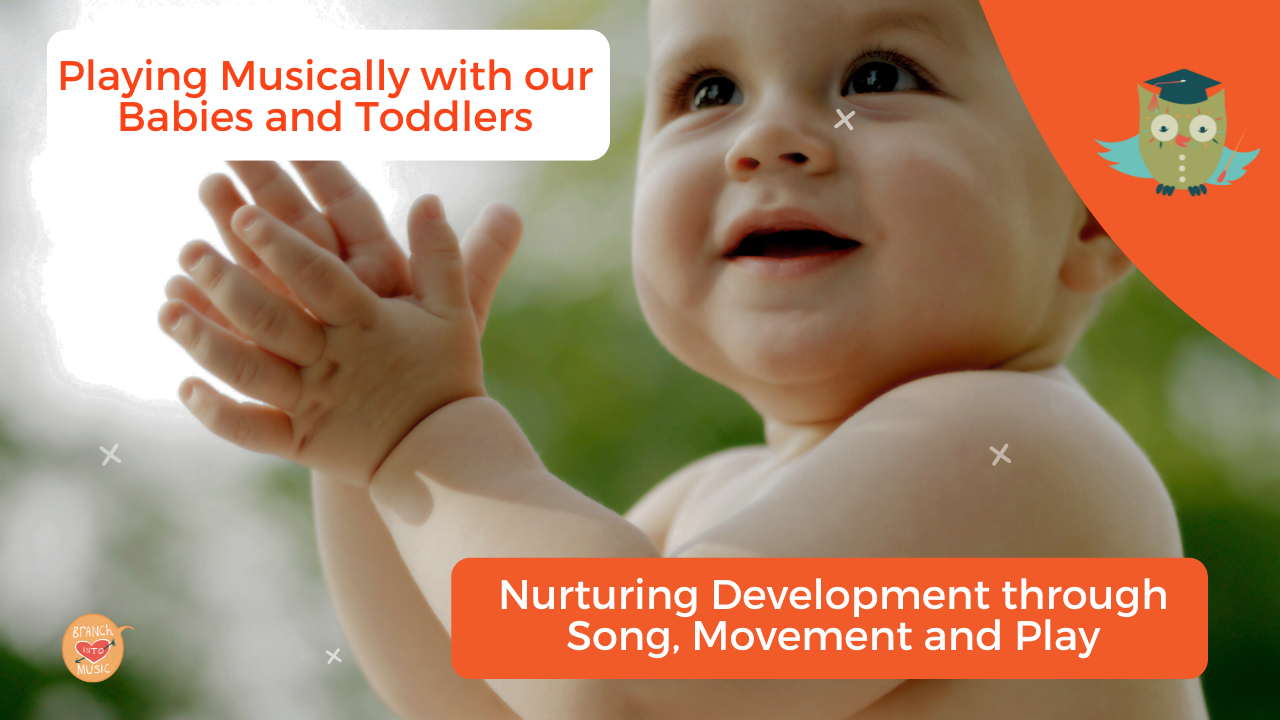Playing Musically with Our Babies and Toddlers: Nurturing Development Through Song, Movement and Play
Nov 11, 2025
Music is food for the growing brain. Even before we are born, we are attuned to sound - babies recognise voices, respond to lullabies, and are soothed by gentle rocking and rhythmic movement.
Yet in our early childhood settings, some children have had limited opportunities for musical play – and many adults feel unsure about their own musicality. “I’m not musical” or “I can’t sing in tune” are phrases we hear far too often. But here’s the truth: every child is musical, and every educator can be too.
Every Child is Musical
Before they can walk or talk, babies can respond to music. They can recognise pitch, rhythm, and even their mother’s voice before birth. Music isn’t an “extra” – it’s a natural and powerful way that children learn, communicate, and form relationships.
When children don’t experience music at home, early childhood educators have a wonderful opportunity to help fill that gap – to bring music, joy, and connection into every day.
The Five Branches Framework for Music in the Early Years 🌿
At Branch Into Music, we use the metaphor of a tree to describe five key “branches” of music-making in the early years: Beat, Singing, Instruments, Movement, and Listening.
Like the branches of a tree, these elements overlap and support one another, giving educators a framework that helps them embed music into everyday practice.
❤️ Beat
Beat is the steady pulse that underlies all music – like the heartbeat of a song. Keeping a steady beat is more than just a musical skill; it’s linked with reading fluency, coordination, and even self-regulation.
Babies and toddlers might not keep a beat yet, but they can feel it — when we bounce, sway, pat, or rock them in time to music. Chanting rhymes during nappy changes or reading rhythmic picture books are simple ways to make beat part of the day.
🎤 Singing
Singing is the most natural and powerful musical activity for young children. It lifts moods, lowers stress, strengthens bonds – and children absolutely love the sound of your voice.
When educators, parents and carers sing, they model confidence and authenticity. You don’t need a “perfect” voice – just an enthusiastic one! Nursery rhymes and lullabies build language, rhythmic awareness, memory, and emotional connection. Singing also makes routines magical: handwashing songs, tiding-up jingles, or transition tunes can turn ordinary moments into joyful rituals.
🥁 Instruments
Instrument play gives children the chance to explore sound, develop fine and gross motor skills, and express themselves creatively. And you don’t need fancy instruments – think pots, pans, spoons, or shakers made from rice and jars!
Through instrument play, children learn contrasts such as loud/soft and fast/slow, and practise taking turns and working together. It’s less about performance and more about joyful exploration.
🚶 Movement
Music and movement go hand in hand. Through movement, children learn to control their bodies, balance, and spatial awareness – all essential for learning and development. Movement to music, especially across the midline, also supports brain development and helps integrate the left and right hemispheres.
For babies, it might be gentle rocking or swaying. For toddlers, it might be action songs like “Teddy Bear, Teddy Bear” or playful tickling rhymes like “Round and Round the Garden.” Movement connects the body and brain in powerful ways.
👂 Listening
Listening is the foundation for communication and literacy, yet in our noisy world, true active listening is rare. Educators, parents and carers can help children develop listening skills by naming sounds (“Can you hear the birds?”), or pausing to notice what is going on in the world around them.
Introduce children to music from many cultures and genres – folk, classical, Indigenous, and world music. Talk about what they hear: “Is the music fast or slow? How does it make you feel?”
Supporting Development Through Music
When we use music intentionally, we nurture the whole child:
🎵 Physical: Beat and movement build coordination, balance, and body awareness.
🧠 Cognitive: Music strengthens memory, focus, and problem-solving.
💬 Language: Songs and rhymes develop vocabulary and phonological awareness.
💛 Social-emotional: Shared music-making fosters belonging, empathy, and connection.
Music isn’t an add-on - it’s a foundation for healthy early learning and development.
Overcoming Barriers
Many educators, parents and carers worry they are not “musical enough” to "teach" music. But children don’t need professional musicians – they need engaged, playful, responsive adults. The key ingredients are presence, joy, and authenticity.
Professional learning can also help educators rediscover their own musicality and confidence. Once we let go of perfection and simply sing, move, and play, the magic unfolds.
Conclusion
Music is a universal language that nourishes the body, mind, and spirit. By embracing the Five Branches Framework for Music in the Early Years – Beat, Singing, Instruments, Movement, and Listening – educators can weave music into the daily rhythm of early learning environments.
The result? Happier, more engaged children; stronger relationships; and a deep sense of belonging and joy.
In offering children a musical childhood, we give them not only the skills for learning, but experiences of joy, creativity, and connection that will last a lifetime. 🌱
About the Author
Anne Belcher is a music educator, lecturer, presenter and founder of Branch Into Music. She is passionate about empowering early childhood educators and families to make music simple, joyful, and meaningful – no matter their background or confidence level.
Anne delivers professional development workshops and conference presentations across Australia, helping educators discover how easy and powerful it can be to weave music and movement into everyday learning.
👉 Learn more at www.branchintomusic.online/PD
Stay connected with news and updates!
Join our mailing list to receive the latest news and updates from Branch Into Music.
Don't worry, your information will not be shared.
We hate SPAM. We will never sell your information, for any reason.

